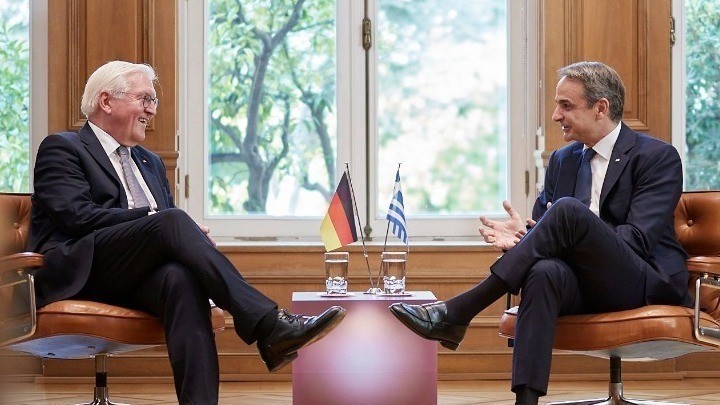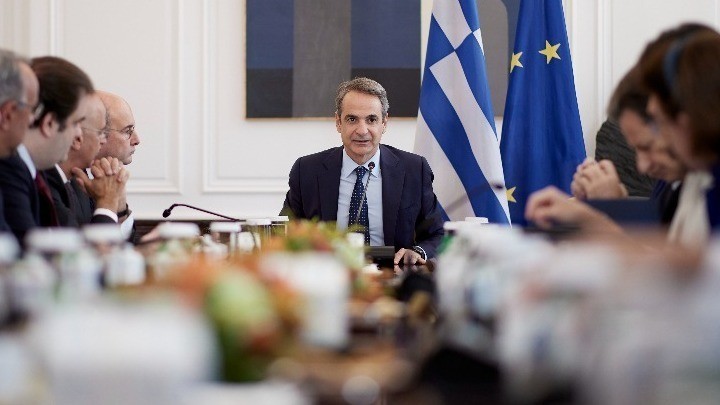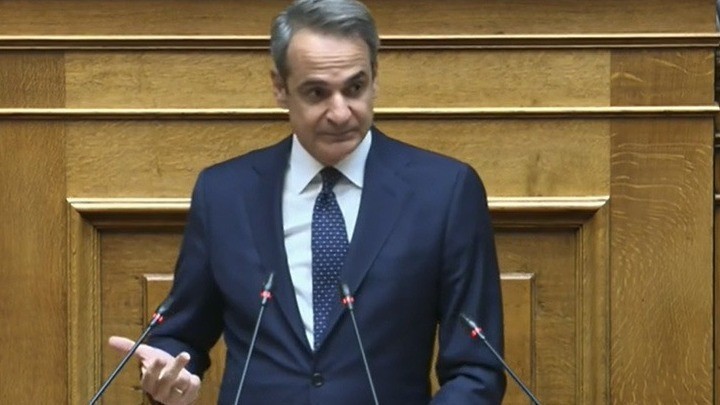
PM Mitsotakis chairs cabinet meeting focusing on new rules for setting the minimum wage

The government is preparing a new way of calculating the minimum wage, in which its reduction will be forbidden by law, Prime Minister Kyriakos Mitsotakis said in his opening remarks to the cabinet meeting on Thursday. He stressed that the government’s pledge to increase the minimum wage to 950 euros a month will be honoured before the end of its term.
“The “protagonist” in our session now is the new increase in the basic wage, with the prospect that this will increase to 950 euros, as we have promised, in 2027. Today, however, we will discuss the new, permanent system for setting it after 2027. I would say that it is a crucial initiative, as from now on it will be forbidden by law to reduce the basic wage, while two criteria will determine by how much it will increase: on the one hand, the rate of growth and the improvement in the economy’s productivity and, on the other hand, inflation, particularly the inflation that affects lower incomes,” Mitsotakis said.
The better the economy is doing and the more productivity improves, the more starting salaries will increase, the prime minister said, while salaries will also offset higher prices when they rise. “This is in any case the course we have adopted in all the past years,” he added.
He repeated that the goal was to increase monthly wages by 2027 to a minimum of 950 euros and an average of 1500 euros, or almost 50% and 45%, respectively, of what they were in 2019. He also noted that the new system will benefit civil servants, as their starting wage will be in step with the basic wage in the rest of the country.
“In other words, it is an important reform that concerns all workers, having as its focal point, as I said, the clause that pay can no longer be reduced but only increased. It is an insurance that is established for the first time in Greece, protecting income against the threat of it being restricted,” Mitsotakis said.
He noted that it was made possible by the overall economic policy following by the government after the end of the crisis, “which now creates a certainty, a security about the future while also taking care of the other essential field of production, entrepreneurship, which it relieves or burdens.”
In this context, the prime minister noted that 50-plus taxes that had been lowered, the reduction of social insurance contributions, combined with a fiscal policy producing primary surpluses when other countries were seeing rising deficits and higher taxes.
“In our country, the course is reversed, vindicating the two pillars of its progress: Fiscally balanced choices but also tax justice,” he added.
Mitsotakis said that the finance ministry will be presenting the changes in the way and timing of submitting income tax returns, with new firm submission dates between March and July, an end to extensions and discounts for those that submit on time.
He also touched on the issue of the qualifications of performing artists, saying that the government will soon announced the creation of a Higher School of the Performing Arts, which the schools of the National Theatre, National Opera, Theatre of Northern Greece, Thessaloniki Conservatory and the State School of Orchestral Art will all be part of, while several private dance, music and drama schools will be placed under the supervision of the education ministry.
The prime minister also referred to events outside of Greece, starting his address by expressing his support for Spain following the disastrous flooding in Valencia, which claimed almost 100 victims, saying this once again highlighted the crucial role of civil defence and preventive evacuations.
He also ending his remarks by referring to a foreign policy issue, namely his upcoming meeting with Cyprus President Nikos Christodoulides “in the light of yesterday’s important talks that he had at the White House, the first visit by a Cypriot leader in 28 years.”
The prime minister said this was an important indicator of the improvement in relations between Cyprus and the United States and its importance as a pole of stability in a volatile environment of continued conflict in the Middle East.
“It is, at the same time, however, a development that indicates the benefits arising from an active diplomacy, which is based on constant coordination between Athens and Nicosia,” he added, noting that Cyprus and the resolution of the Cyprus issue had gone from a virtual standstill to “being treated as part of a solution in the ‘equation’ of the most sensitive region on the global map”.
source ANA-MPA
Ακολουθήστε τη HELLAS JOURNAL στη NEWS GOOGLEUS President receives Cyprus President at White House, pledges support for reunited Cyprus [VIDEO]

